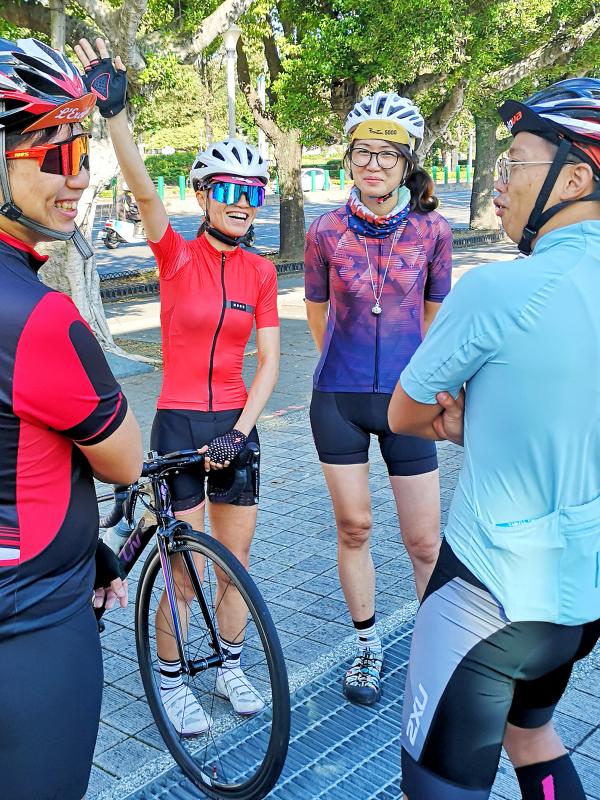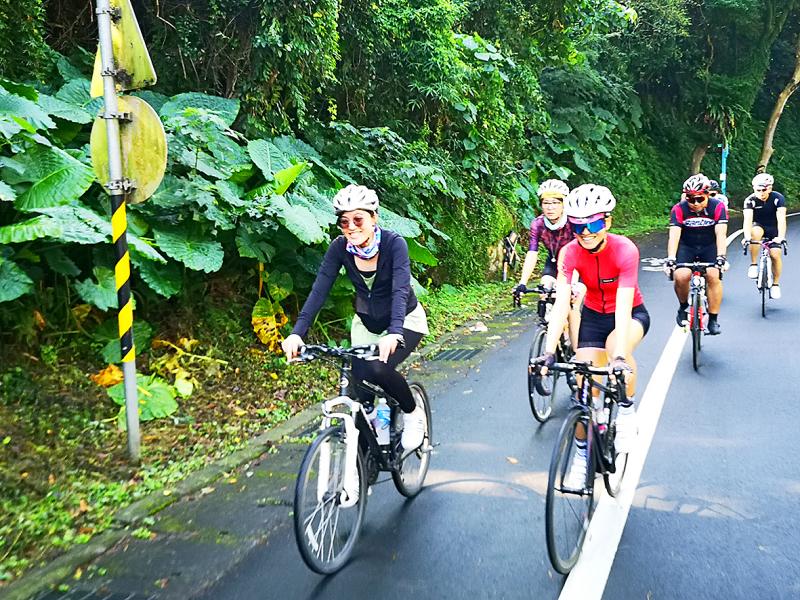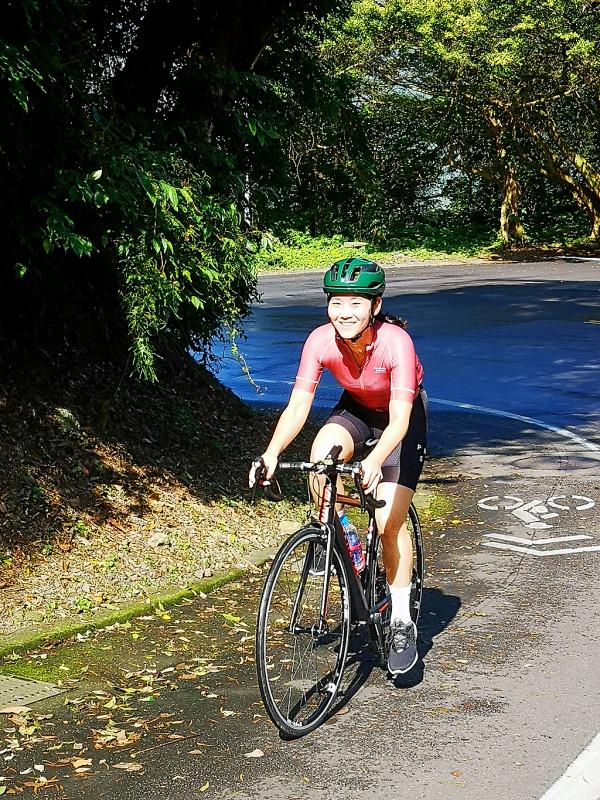“There are lots more female cyclists in Taiwan now there used to be,” says Lucy Hsieh (謝雅惠). “But there are still vastly more male than female cyclists.”
I try to make a joke, something about her lass being half empty, but it is either over her head or, more likely, beneath her contempt. I decide to be more sympathetic. Less male. Why does she think more women don’t cycle?
Hsieh suggests that I try to think from the viewpoint of a woman.

Photo: Mark Caltonhill
I try. She waits … before finally helping me out with a few possible reasons:
“One: Women’s muscle endurance is inherently inferior to that of men.”
I want to interject that this is possibly not true. I mean, I was overtaken by plenty of women cyclists in the closing stages of this year’s King of Mountains and Ironman races, just when I could have most used some “endurance.”

Photo: Mark Caltonhill
But thinking about Taiwan’s sporting culture, or relative lack of it, just at the age when I was doing after-school training in the evenings and participating in cross-country races on Saturdays back in the UK, is when most local teenagers are going to cram schools or doing catch-up lessons. But surely this applies to boys as much as to girls?
“Two: Beginner cyclists tend to ride alone for a long time before they dare to participate in a group,” she says, suggesting that women worry more about not being able to keep up and making other riders wait for them.
Okay, male lack of self-awareness is a thing, granted.

Photo: Mark Caltonhill
Three: “Women need to use the bathroom more frequently during their menstrual period so cannot cycle too far into the countryside.”
LAST PEOPLE RIDING

Photo: Mark Caltonhill
Hsieh, along with husband Tony Cheng (鄭任峰), is leader of the Cycling Cats (貓騎單車社), an ad hoc social-media-based group of bikers, which, although it sounds kind of feminine, turns out to have been started a decade ago by a bunch of male Chinese Culture University (中國文化大學) friends: Max Hu (胡哲維), Li Bo-tsun (李柏村), Lin Chun-hung (林俊宏; a.k.a. Brother Springtime 春哥) and Lin Chu-hsuan (林鉅桓; better known as Black Ghost 黑鬼).
Cheng met Hu on his first round-island ride (環島), Hsieh joined later and, after the founders had drifted off to do other sports or raise families, they became the group’s leaders by default. They have no children themselves but, by coincidence, do have a cat.
I track down Max Hu on Facebook.
Yes, he was one of the founders and yes they have all pretty much given up. Personally, he’d had “a beef with the bike industry.”
I ask him why “Cats” and he sends back a picture of a panda. This throws me for a moment until I remember that the Chinese for panda is “cat-bear” (貓熊) or a “bear-cat” (熊貓).
The Cats ride together a couple of times each month. When it’s not raining. Or when the sun is out.
That’s the fourth reason many women don’t like cycling in Taiwan, Hsieh says. “They don’t want to get a tan.”
Now I suspect she’s teasing me.
“And we’re not really the leaders,” she says, pointing out that anyone in the group is free to suggest a route and lead the ride. But, reason number five: “Women’s sense of direction isn’t good, so it’s better for someone to show us the way.”
At which point I know she’s mocking me, especially after she starts sniggering.
Most of the group’s rides are led by Hsieh or Cheng, however, with the others bringing up the rear to encourage the beginners not to give up. In fact, the Cats have an informal rule whereby, whenever the front riders get to the top of a hill, they go back to the last rider and repeat part of the climb.
ALL ABOUT THE HILLS
Ascending is a lot of what Cycling Cats’ cycling is about. Not steep hills or long hills but, knowing that many novice cyclists have a block about climbing and, often more intensely, a fear of descending, they try to include several hills on their excursions in the Yangmingshan (陽明山), Wulai (烏來) or Pingsi (平溪) areas.
Hsieh remembers her own first rides in 2013, on a mountain bike almost exclusively along Taipei’s flat riverside bike paths. Only once she’d borrowed a road bike and started climbing did she become obsessed with cycling.
“It was like switching to the sports car of the cycling world,” she says.
It is this obsession she’s keen to share with other riders. Not just women, though in fact, between 40 and 60 percent of the riders have been women on the days I’ve met the Cats when riding on local hills. And they’re usually a good-sized group; always over a dozen and sometimes two dozen, so they’re obviously doing something right.
“Women are not good at repairs,” Hsieh offers as reason number six for their disinclination to ride bicycles.
She’s presumably unaware that most of us men are not good at repairs either. In fact, the first thing many male cyclists do when suffering “a mechanical,” even something as innocuous as a flat tire, is to call Uber to take them to the nearest bike shop.
Such behavior is not encouraged among the Cats, and novices are taught or helped or taught-by-helping to fix punctures and other recurrent problems. Experiences relating to everything from bikes and components to shoes and clothing are shared too.
What you’re unlikely to hear are discussions of NT$300,000 bikes and NT$100,000 wheels; more likely someone will know someone who can trade you a second-hand seat post or lend you a helmet. Their ethos is helping people get started without cashing in their savings
If they really fall in love with cycling, they can spend more money later and do more adventurous rides. Like Hsieh herself, who participates in some organized events, such as the 160km-long Tour of Taipei race (環大台北160K), and Liv-sponsored Women’s ‘Sword in the Wind’ event (Liv女子風中劍). She’s more enthusiastic about self-challenges on Taiwan’s “classic routes,” however, like the 3275m-high Wuling (武嶺) climb and 1050km-long round-island ride, when she can go at her own pace and stop to appreciate the scenery.
Is this another attribute of women cyclists? Certainly the Cats do like to stop and take a lot of group selfies whenever there’s a half-decent view to pose in front of.
They also stop frequently for coffee and cake. Or coffee and ice-cream. Or waffles. Women may or may not have a good sense of direction, but they seem to know their way to the best refreshments.
Mark Caltonhill bikes, and writes, and writes about bikes.

The primaries for this year’s nine-in-one local elections in November began early in this election cycle, starting last autumn. The local press has been full of tales of intrigue, betrayal, infighting and drama going back to the summer of 2024. This is not widely covered in the English-language press, and the nine-in-one elections are not well understood. The nine-in-one elections refer to the nine levels of local governments that go to the ballot, from the neighborhood and village borough chief level on up to the city mayor and county commissioner level. The main focus is on the 22 special municipality

The People’s Republic of China (PRC) invaded Vietnam in 1979, following a year of increasingly tense relations between the two states. Beijing viewed Vietnam’s close relations with Soviet Russia as a threat. One of the pretexts it used was the alleged mistreatment of the ethnic Chinese in Vietnam. Tension between the ethnic Chinese and governments in Vietnam had been ongoing for decades. The French used to play off the Vietnamese against the Chinese as a divide-and-rule strategy. The Saigon government in 1956 compelled all Vietnam-born Chinese to adopt Vietnamese citizenship. It also banned them from 11 trades they had previously

Hsu Pu-liao (許不了) never lived to see the premiere of his most successful film, The Clown and the Swan (小丑與天鵝, 1985). The movie, which starred Hsu, the “Taiwanese Charlie Chaplin,” outgrossed Jackie Chan’s Heart of Dragon (龍的心), earning NT$9.2 million at the local box office. Forty years after its premiere, the film has become the Taiwan Film and Audiovisual Institute’s (TFAI) 100th restoration. “It is the only one of Hsu’s films whose original negative survived,” says director Kevin Chu (朱延平), one of Taiwan’s most commercially successful

Jan. 12 to Jan. 18 At the start of an Indigenous heritage tour of Beitou District (北投) in Taipei, I was handed a sheet of paper titled Ritual Song for the Various Peoples of Tamsui (淡水各社祭祀歌). The lyrics were in Chinese with no literal meaning, accompanied by romanized pronunciation that sounded closer to Hoklo (commonly known as Taiwanese) than any Indigenous language. The translation explained that the song offered food and drink to one’s ancestors and wished for a bountiful harvest and deer hunting season. The program moved through sites related to the Ketagalan, a collective term for the